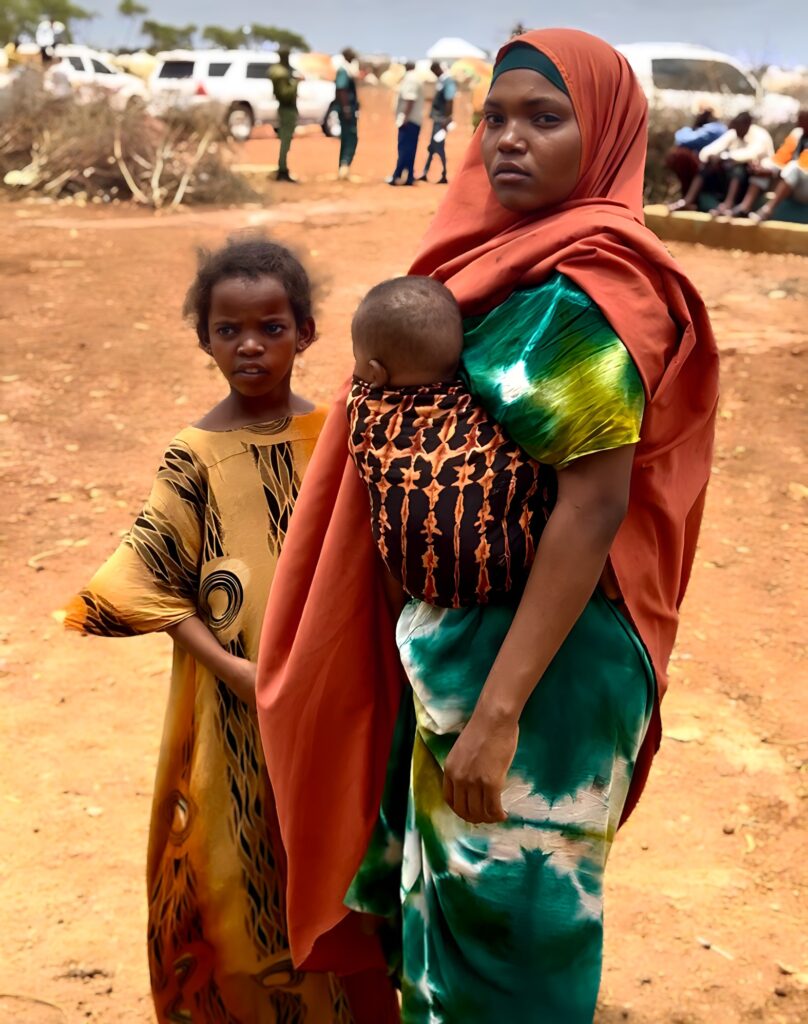In Somalia, the reality of climate change is felt daily. Once fertile lands are now barren, while families struggle to find safe drinking water. As drought ravages communities across the country, almost 3 million people have been displaced, seeking refuge in internally displaced people (IDP) camps.
Fatima and her family are facing the very worst consequences of drought.
“The earth is dry, our farms are dying,” Fatima says about her once robust farming village, Balcad in southern Somalia, that was destroyed by drought.
Crop failure is rampant, and livestock deaths have become commonplace.
“We’ve lost our crops, our animals, and the life we knew,” Fatima says.
The loss of her farming livelihood has been a profound blow to the Fatima… community’s identity and sense of purpose.
Driven by the sheer will to provide for her children, and like many from their village, Fatima and her family fled.
The endless search for water
Fatima’s family joined the growing number of those displaced, their belongings reduced to what could be carried on their backs as they travelled in search of stability.
More importantly for Fatima and her children, the search for water dictated their every move.
“We left in search of water,” she recalls. “It’s a daily struggle, finding enough just to survive.”
The journey brought them face to face with the harshness of their changing environment, where dried-up wells were a common disappointment.
The road to the IDP camp was a path shared by more than physical challenges – it was a mental and emotional marathon. Fatima encountered others along the way, each with stories that echoed her own.
“We shared what little we had,” she says, “and supported each other through the journey.”
Fatima’s determination was fuelled by the need to protect her children and find a safe haven where they could restart their lives.
Fatima found Gargaar 1 IDP camp to be crowded and bustling with the noise of hundreds of other families, but ultimately she was relieved. Here she felt safe, the IDP camp offered her a break from the constant search for water and food.
“We are many here, each with our own story of how the drought has pushed us from our homes,” she says.
For the first time in months, Fatima felt a glimmer of stability.
Planting seeds of long-term hope
The aid provided by humanitarian organisations like Islamic Relief has been a lifeline for Fatima and her family.
“The food, the water—it helps. We need more than just basics; we need a way to live, not just survive,” she says.
“I want to return home, but our village needs help to recover,” she states, outlining the dire need for long-term support to rebuild their lives.

Islamic Relief has been a cornerstone of the relief efforts in Somalia. We have active in setting up emergency water stations, distributing food parcels, and providing medical assistance to those in need.
Our support in Somalia extends beyond immediate needs. Islamic Relief has initiated sustainable projects that aim to help families like Fatima’s regain their livelihoods.
“They are teaching us how to harvest rainwater and have given us seeds that can grow in this harsh climate,” Fatima explains.
“The future is uncertain, but our will to survive and rebuild is not.”
Fatima’s story is a stark reminder of the ongoing humanitarian crisis in Somalia. Her journey and the plight of countless others underscore the urgent need for sustained and comprehensive support to address not just the immediate needs but also the long-term recovery of displaced communities.
Fatima’s journey is a mirror reflecting the larger issue faced by millions of others in Somalia. Islamic Relief is helping, providing much-needed relief and a promise of recovery to 1.82 million people.
More help is needed however – the situation in Somalia demands continued attention and support from the global community.
Please help Islamic Relief continue to support vulnerable people like Fatima and her family. Donate now.










